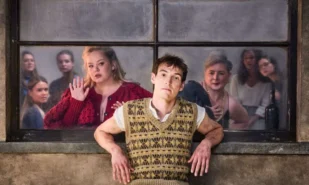Films made by young people – also called student films – have always been an important part of cinematography. Often short, usually up to 15 minutes in length, and severely underfunded, student films tend to bring a new fresh outlook on societal problems and daily life events that are often left unnoticed by the already established filmmakers. Special film festivals have been created for young filmmakers to show their work, where they are granted a chance to open the doors to the big world of professional cinema. Many talented and critically acclaimed directors such as Tarkovsky, Scorsese, Spike Lee and many others stated their cinematic journey from making films while still being at university. In order to better understand what films student filmmakers are shooting today, we interviewed a young student director Paul McPherson about his upcoming project The Red Chamber. In this article you will find out how young cinematographers are making heartfelt films about the most adult topics.
The Red Chamber
Films made by young people – also called student films – have always been an important part of cinematography. Often short, usually up to 15 minutes in length, and severely underfunded, student films tend to bring a new fresh outlook on societal problems and daily life events that are often left unnoticed by the already established filmmakers. Special film festivals have been created for young filmmakers to show their work, where they are granted a chance to open the doors to the big world of professional cinema. Many talented and critically acclaimed directors such as Tarkovsky, Scorsese, Spike Lee and many others stated their cinematic journey from making films while still being at university. In order to better understand what films student filmmakers are shooting today, we interviewed a young student director Paul McPherson about his upcoming project The Red Chamber. In this article you will find out how young cinematographers are making heartfelt films about the most adult topics.
The upcoming short film The Red Chamber opens a new conversation about women-immigrants in sex work, giving an insight about the competitive yet lonely nature of this profession. Made entirely by student filmmakers in their last years of university, the film, although still in the making, promises to shed a new light on this question by focusing on psychological rather than physical aspect of this hidden everyday reality of lives of the marginalised women.
The way we talk about sex work has changed considerably in recent years for the better, however, the stigmatisation of women in this profession has not gone away, and today, the state of the UK’s sex work laws are still in want. Lacking accurate representation in cinema, The Red Chamber takes a non-voyeuristic approach when it comes to depicting the reality of the illegal Asian massage parlour, rather than glamourising or degrading the lives of sex workers’ often seen in popular media.
The Red Chamber is set in a modern day British brothel and follows Hongmei (Aigail Lee), a 38 year old migrant sex worker. When the sudden dismissal of Hongmei’s colleague coincides with the arrival of a new younger worker, Hongmei starts to believe that her position at work is also in danger, This sets her out on a psychological journey of coming to terms with her being inevitably replaced, but also the realisation of how isolating this work can be when it is time to leave. The notions of loneliness and segregation from the outside world are apparent through as the camera focuses entirely on the life inside the brothel with the glimpses of outside world appearing on the screen only in the form of the brothel’s visitors and the workers’ conversations on the phone.
Following the interactions between the two central female characters, Hongmei, the new girl, Lisha (Coco Isabella Wong), the director brings out a deeper meaning behind the idea of an unconventional mother-daughter relationship, in which the younger traditionally replaces the older one. Another female character, Madame, the mistress of the brothel, possesses power over the other two by being in charge of their employment. Despite the fact that she stands higher than the other workers, she is also the victim of the inescapable situation they are in and could have started where Lisha is right now.
Authentic depictions of loneliness and the duality of narratives is a common theme in Paul McPherson’s work, manifesting in his previous directorial short-film, In Any Case, based on Murakami’s short story Men Without Women. In order to accurately portray this side of the sex industry, the screenplay has been informed by conversations with sex workers of their working experiences. Hongmei and Lisha are played by professional actors and most of the time throughout the film converse in Mandarin, while their dialogues are translated into English with subtitles. This approach only adds authenticity to the key narrative of the film of being a sex worker in a foreign country and isolation that comes with it. The director’s choice to focus on filming inside a house as well adds to the protagonist’s invisibility to the outer world, as she is aware of the outer world’s existence but we never see her interact with it.
The Red Chamber is still in production and will be showcased at several short film festivals in London later this year. Being a student project, the film is crowdfunded to help with wages for the actors and other production costs, such as food, transportation and props. Sponsors of The Red Chamber will receive an honourable mention as a sponsor in the credits and a private copy if the film. For the public it will be available after the planned film festival participation is completed. The link for finding additional information regarding the film and to becoming a sponsor is provided below:





